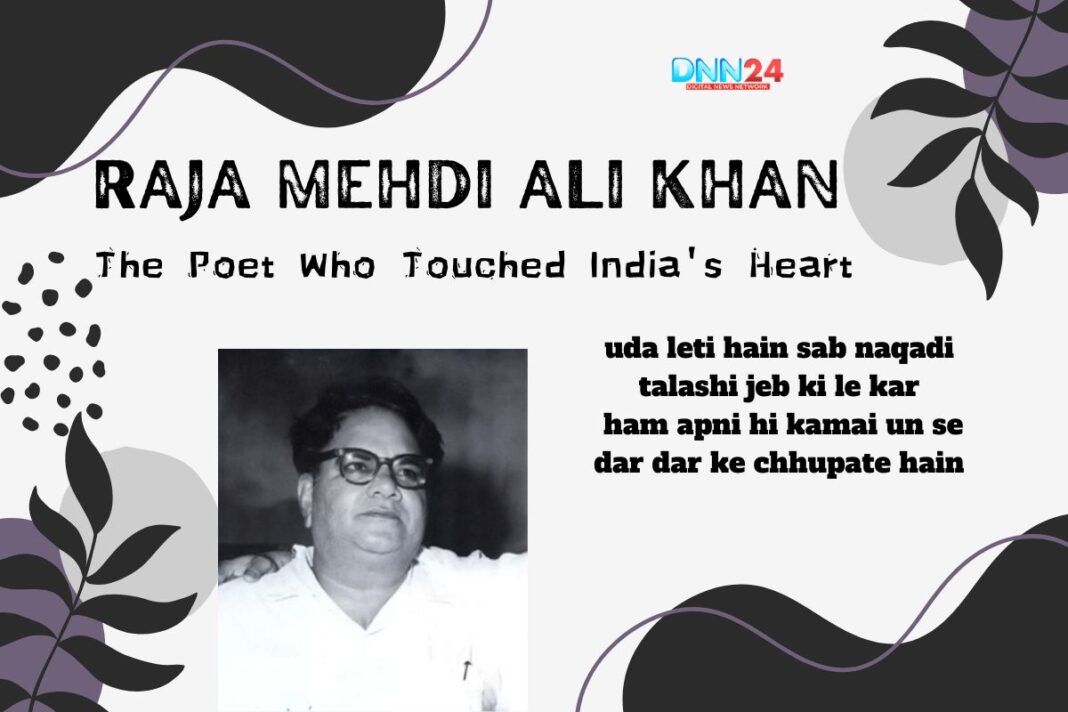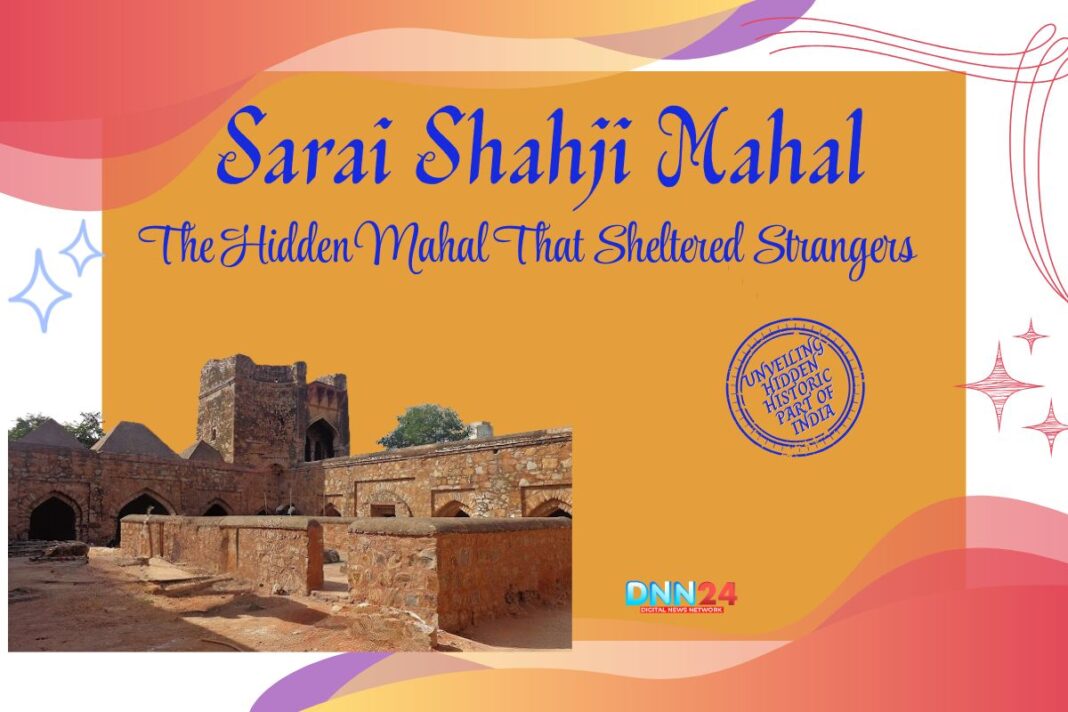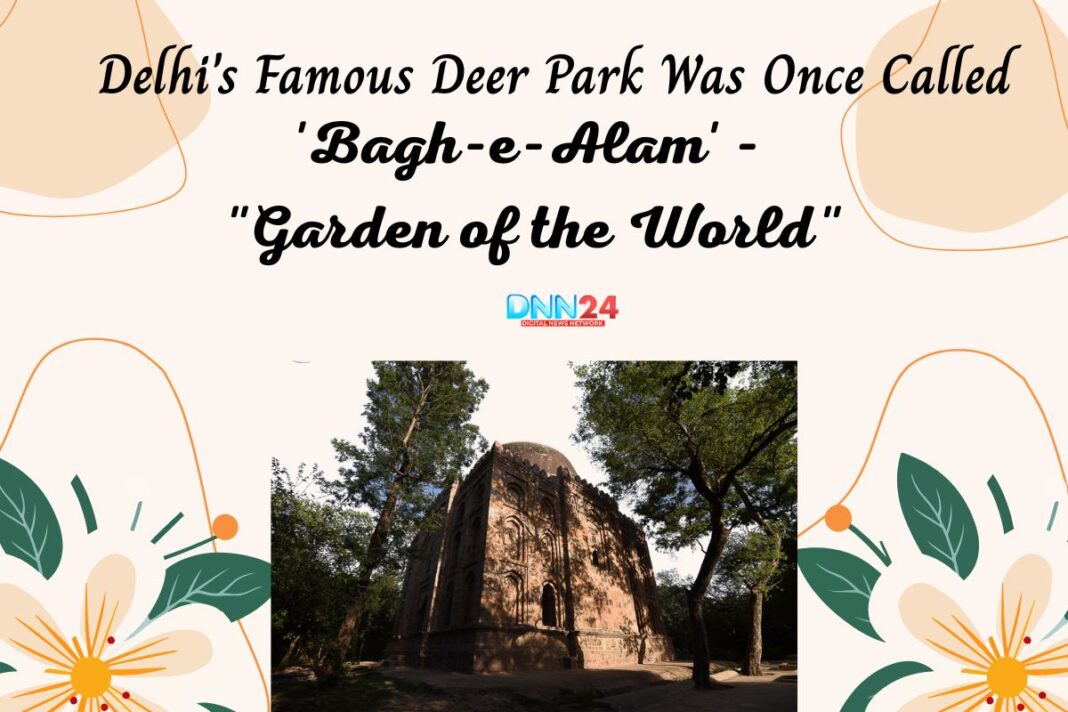Raja Mehdi Ali Khan was born in 1915 in Karmabad, Punjab, into a world that would test his spirit from the beginning. When he was still a young boy, his father passed away, leaving him to be raised by his remarkable mother, Hebay Saheba. She was not just any mother but a celebrated Urdu poet who understood the power of words and the healing they could bring.
hum ne bakri ke bachchon ko kamron mein nachana chhoD diya
Raja Mehdi Ali Khan
naraaz na ho ammi hum ne har shauq purana chhoD diya
Life was not kind to them financially. Money was always tight, and there were days when the future seemed uncertain. But Hebay Saheba made sure her son never stopped learning. She filled their home with poetry and literature, introducing him to the works of great poets like Allama Iqbal, who later became young Mehdi’s mentor. Those early years of struggle gave birth to something beautiful in the boy.
alif jo aalu khaega
Raja Mehdi Ali Khan
wo moTa ho jaega
be barish jab aati hai
koyal shor machati hai
The pain of losing his father, the worry about money, and the gentle strength of his mother all mixed to create a poet who could write about sadness without being bitter, about loss without losing hope. Late into many nights, young Mehdi would sit by a flickering lamp, turning his invisible wounds into words that would one day comfort millions of hearts across India.
sikandar ne poras se ki thi laDai jo ki thi laDai to main kya karun
Raja Mehdi Ali Khan
jo kauraw ne panDaw se ki hatha-pai jo ki hatha-pai to main kya karun
Brotherhood in the Time of Chaos
The 1940s brought Raja Mehdi Ali Khan to Delhi, where All India Radio became his second home and real training ground. Here, destiny introduced him to Saadat Hasan Manto, the brilliant and rebellious storyteller who would become like a brother to him. Both were literary rebels in their own ways, using humour and poetry as weapons against the harshness of everyday life.
maro na hamein daddy bachpan ka zamana hai
Raja Mehdi Ali Khan
mausam hai ye hansne ka hans hans ke bitana hai
When Manto decided to try his luck in Bombay’s film world, he took Raja. They shared a cramped flat with actor Shyam, and together they created a brotherhood that survived on laughter, literature, and an unshakeable faith in each other’s talents. These were the days when their pockets were empty but their hearts were full. One famous incident involved Shyam accidentally setting his mattress on fire with a cigarette. Instead of panicking, the three friends turned the smoky drama into comedy, with Raja comparing Shyam to Hanuman and joking about his “tail being on fire.”
tota chheDe thap-thap tabla maina git sunae
Raja Mehdi Ali Khan
ullu jab mirdang bajae kawwa shor machae
When the Partition riots tore India apart, Raja Mehdi Ali Khan and his wife Tahira made a brave choice. Despite being Punjabi Muslims, they decided to stay in India, believing in human goodness over communal hatred. His early success came with songs like “Mera Sunder Sapna Beet Gaya” from the film “Do Bhai,” written during these turbulent times.
hansi kal se mujhe is baat par hai aa rahi KHalu
Raja Mehdi Ali Khan
ki KHala kah rahi thin aap ka hai qafiya aalu
The Art of Making Hearts Sing
Raja Mehdi Ali Khan treated every composer with the same warmth and respect, whether they were legends or just starting out. This approach helped him build creative partnerships that would change Hindi film music forever. His most magical collaboration was with composer Madan Mohan, who together created songs that perfectly balanced joy and melancholy.
ai chacha KHarru shichof ai mamun candy assalam
Raja Mehdi Ali Khan
ek hi KHat hai ye mamun aur chacha donon ke nam
Songs like “Naino Mein Badra Chhaye” and “Lag Jaa Gale” became timeless classics. There’s a beautiful story about how “Naino Mein Badra Chhaye” was born. Raja was so unwell during the recording that he didn’t even have his diary or pen. When Madan Mohan asked for the lyrics, Raja closed his eyes, went quiet momentarily, and delivered those immortal opening lines straight from his heart.
nainaa barse rim-jhim rim-jhim piyaa tore aavan kii aas
Raja Mehdi Ali Khan
nainaa barse rim-jhim rim-jhim
Lata Mangeshkar, who fondly called him “Raja Bhaiya,” always remembered how he patiently guided her through every word of his lyrics, even when battling illness. His innovative use of the word ‘Aap’ in film songs made Raja’s songs special, making every listener feel personally addressed.
Lag Ja Gale Ki Phir Ye Hasin Raat Ho Na Ho
Raja Mehdi Ali Khan
Shaayad Phir Is Janam Men Mulaaqaat Ho Na Ho
His poetry was never distant or fancy but warm and inclusive, like a conversation between friends. Even comedian Mehmood, who once worked as Raja’s chauffeur, remembered him not just for his poetic genius but for his incredible hospitality, fine cooking, and endless humour that never left him, even during his most difficult days.
aap kii nazro.n ne samjhaa pyaar ke qaabil mujhe
Raja Mehdi Ali Khan
dil kii ai dha.Dkan Thahar jaa mil ga.ii manzil mujhe
A Legacy Written in Golden Words
Raja Mehdi Ali Khan’s contribution to Indian culture goes far beyond his film songs, though they remain part of our everyday lives. His collections of Urdu poetry, including “Andaaz-E-Bayaan Aur” and “Mizraab,” are treasured in literary circles. He also wrote delightful children’s stories, later published as “Rajkumari Champa,” showing his love for young minds despite never having children.
mirii yaad me.n tum na aa.nsuu bahaana
Raja Mehdi Ali Khan
na jii ko jalaanaa mujhe bhuul jaanaa
What makes his legacy truly special is how he responded to the tragedy of Partition. Instead of becoming bitter, he wrote about the pain, believing in compassion and unity. His words during that dark period reflected hurt but never hatred, hope but never false optimism. Many of his film songs have become the soundtrack to Indian life, played at weddings, sung during farewells, and hummed during quiet moments of reflection.
aap yuu.n hii agar ham se milte rahe
Raja Mehdi Ali Khan
dekhiye ek din pyaar ho jaa.egaa
Raja Mehdi Ali Khan proved that true greatness lies not in loud victories but in quiet endurance, in spreading light for others even while walking through your shadows. He ruled the world of poetry and music not through force but through the gentle power of words that could touch any heart. Though he left this world, his songs live in the hearts of millions, making him immortal. His story teaches us that staying gentle and human in a harsh world is not weakness but the greatest strength of all.
saare jahaa.n se achchhaa hindostaa.n hamaaraa
Raja Mehdi Ali Khan
ham bulbule.n hai.n is kii ye gulsitaa.n hamaaraa
Raja Mehdi Ali Khan remains the eternal “Raja” of verse and feeling, whose kingdom of beautiful words knows no boundaries of time, religion, or sorrow.
Also Read: Dushyant Kumar: The Rebel Hindi Poet Who Spoke Truth to Power
You can connect with DNN24 on Facebook, Twitter, and Instagram and subscribe to our YouTube channel.



